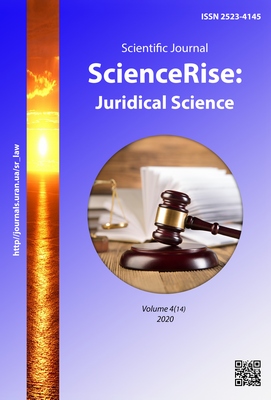Assessment of the influence of sociological research as a new type of evidence in cases of protection of intellectual property rights
DOI:
https://doi.org/10.15587/2523-4153.2020.218545Keywords:
sociological research, evidence, similarity to the degree of confusion with another designationAbstract
An important precondition for making a lawful and reasoned court decision is to establish the facts of the case, ie a certain range of facts, to which the law relates the legal consequences. They confirm the claims and objections of the parties and are crucial in the process of proof. Given the principles of equality of all participants in the trial before the law and the court, the adversarial nature of the parties, this institution is an important and necessary element of a fair, impartial and timely resolution of disputes by the court.
In order to properly resolve disputes in cases of protection of intellectual property rights, which are subject to commercial courts, it is necessary to analyze and establish the actual relationship of the parties in a particular case. To this end, the court should find out whether the defendant has in fact committed violations, affecting the plaintiff's legitimate interests, and whether the defendant has an obligation to restore the plaintiff's rights. However, it is clear that the study of all the circumstances of the case of any commercial dispute is carried out by the court only by examining the evidence that contains information about the facts and information.
The article considers the importance of the results of sociological research as a new type of evidence on the examples of dispute resolution by commercial courts in cases of protection of intellectual property rights regarding the similarity to the degree of confusion with another designation.
Based on the analysis of decisions of commercial courts, the question of how often the survey data are accepted by commercial courts, how it affects the probability that such results will be accepted as evidence, how the acceptance of sociological research by the commercial court as evidence influences consideration of the case is studied.
References
- Treushnikov, M. K. (2005). Sudebnye dokazatelstva. Moscow, 288.
- Smyshliaev, L. P. (1961). Predmet dokazyvaniia i raspredelenie obiazannostei po dokazyvaniiu v sovetskom grazhdanskom protsesse. Moscow, 47.
- Shakarian, M. S. (Ed.) (1998). Grazhdanskoe protsessualnoe pravo Rossii. Moscow, 504.
- Musin, V. A., Chechina, N. A., Chechot, D. M. (Eds.) (1998). Grazhdanskii protsess. Moscow, 408.
- Reshetnikova, I. V. (2000). Kurs dokazatelstvennogo prava v rossiiskom grazhdanskom sudoproizvodstve. Moscow, 288.
- Fatkullin, F. M. Obschie problemy protsessualnogo dokazyvaniia. Kazan, 206.
- Hospodarskyi protsesualnyi kodeks Ukrainy (1992). Pryiniatyi 06.11.1991. Vidomosti Verkhovnoi Rady Ukrainy, 6, 33.
- Babich, N. S., Batykov, I. V. (2012). Formulirovka voprosa o smeshenii sredstv individualizatsii v soznanii potrebitelei: puti povysheniia kachestva informatsii. Nauchnye problemy gumanitarnykh issledovanii, 7, 141–149.
- Kvita, O. T. (2015). The evidence is in the commercial process: concept and object. Naukovyi visnyk Uzhhorodskoho natsionalnoho universytetu, 33 (1), 169–172. Available at: http://nbuv.gov.ua/UJRN/nvuzhpr_2015_33(1)__43
- Demchenko, T. S. (2002). Problemy harmonizatsii zakonodavstva Ukrainy pro tovarni znaky z mizhnarodno-pravovymy normamy. Kyiv, 215.
- Vasyliev, S. V. (2019). Tsyvilnyi protses. Kyiv: Alerta, 506.
- Rabinovych, P., Ratushna, B. (2014). General Theoretical Problems of the Right to Adequate Proof in the Ukrainian Judicial System (in the Light of the Practice Court of Strasbourg). Visnyk Natsionalnoi akademii pravovykh nauk Ukrainy, 3, 13–14.
- Shtefan, A. S. (2015). The concept of judicial proof in civil proceedings. Chasopys Akademii advokatury Ukrainy, 8 (1 (26)), 64–72. Available at: http://nbuv.gov.ua/UJRN/Chaau_2015_8_1_10
- Luspenyk, D. (2019). Dokazuvannia u tsyvilnomu protsesi: shcho novoho u TsPK ta chomu sud nadilenyi pravom vytrebuvannia dokaziv. Sudovo-yurydychna hazeta, 1 (470). Available at: https://sud.ua/ru/news/publication/132351-dokazuvannya-u-tsivilnomu-protsesi-scho-novogo-u-tspk-ta-chomu-sud-nadileniy-pravom-vitrebuvannya-dokaziv
- Clermont, K. M., Sherwin, E. (2002). A Comparative View of Standards of Proof. The American Journal of Comparative Law, 50 (2), 243. doi: http://doi.org/10.2307/840821
Downloads
Published
How to Cite
Issue
Section
License
Copyright (c) 2020 Kateryna Mudrytska

This work is licensed under a Creative Commons Attribution 4.0 International License.
Our journal abides by the Creative Commons CC BY copyright rights and permissions for open access journals.
Authors, who are published in this journal, agree to the following conditions:
1. The authors reserve the right to authorship of the work and pass the first publication right of this work to the journal under the terms of a Creative Commons CC BY, which allows others to freely distribute the published research with the obligatory reference to the authors of the original work and the first publication of the work in this journal.
2. The authors have the right to conclude separate supplement agreements that relate to non-exclusive work distribution in the form in which it has been published by the journal (for example, to upload the work to the online storage of the journal or publish it as part of a monograph), provided that the reference to the first publication of the work in this journal is included.








